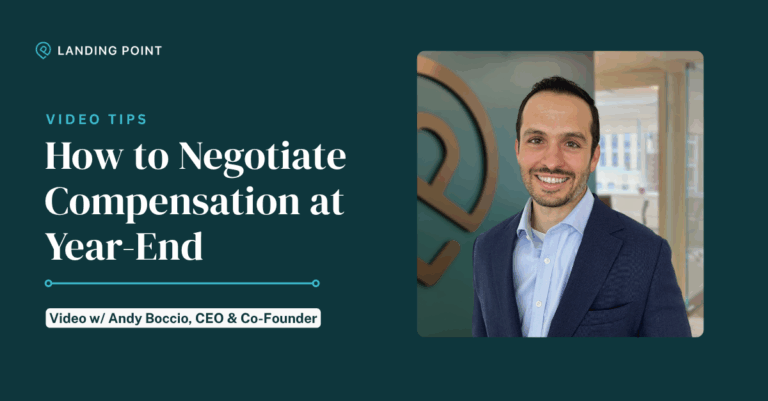By Andrew Boccio, CEO & Co-Founder
How Should You Prep for Year-End Compensation Discussions?
Year-end reviews aren’t just about reflecting on performance, they’re a key opportunity to advocate for your compensation. Preparation can make all the difference in the outcome.
Understanding market benchmarks and framing your request realistically is essential. Without it, you risk misjudging your value—either underselling yourself or asking for too much and weakening your opportunity for increased compensation.
In this video, Andrew Boccio, CEO and Co-Founder at Landing Point, shares practical tips for gathering compensation data and negotiating effectively during year-end reviews.
[Video of Andrew Boccio, CEO and Co-Founder at Landing Point, explaining strategies for negotiating year-end compensation, including gathering market data, comparing firms of similar size, and preparing realistic, evidence-based requests.]
Key Takeaways
Gather comprehensive compensation data: Don’t rely solely on anecdotal information from friends; compile multiple sources.
Research similar firms: Benchmark your role against companies of comparable size and type, not only large multibillion-dollar firms.
Look at both sides of the market: Understanding the low, median, and high ranges gives context for realistic negotiation.
Prepare evidence for your request: Demonstrating knowledge of market rates increases credibility with your employer.
Tailor your approach to your situation: Factor in your firm’s size, industry segment, and your role when presenting your case.
How to Approach Year-End Compensation Discussions
Many professionals underestimate the level of preparation required to negotiate effectively. Here’s how to make the most of your year-end review:
- Use multiple sources: Speak with recruiters, industry peers, and review market reports to get a full picture of compensation trends.
- Be realistic: Avoid cherry-picking only top-tier compensation numbers; your employer is likely benchmarking themselves against the same data.
- Understand firm size differences: A Controller at a $10 billion fund earns very differently than one at a $500 million fund. Align your request with firms similar to yours.
- Build trust: Presenting well-researched, reasonable data demonstrates credibility and professionalism.
- Document your contributions: Pair your market data with your achievements (see Dylan Sullivan’s tips on advocating for yourself during year-end reviews) to strengthen your case.
Related reading from our Newsroom: How to Advocate for Yourself During Year-End Reviews
Ready to Take Control of Your Compensation?
At Landing Point, our recruiters specialize in preparing professionals for year-end discussions and career advancement. Contact us today for guidance on negotiating your compensation effectively.
Transcript
Andrew Boccio:
With review season upon us, one of the things that gets brought up a lot is how to negotiate compensation for year-end. So when you’re going into those conversations, one of the things I always recommend is you need to do your homework and actually get really good comp data. Comp data is more than just asking one or two friends what they make at a similar company.
It’s actually going out and getting really good compiled information on what the market’s like. So we work with a lot of alternative investment firms and no one firm is the same. So just falling into the trap of “I have a friend that is a Controller at XYZ company and he or she makes this” isn’t enough content when you’re going in to negotiate it for yourself.
What I’d recommend doing is actually speaking to a bunch of different sources, whether that’s talking to recruiters, talking to peer groups that exist, and compiling a lot of good information. You want to look for the good and the bad, right? So cherry picking just what the top 1% of people make isn’t going to be good enough because your employer is also doing the same type of homework.
You lose a little bit of that trust factor if you’re going into it with a much higher number than what the markets entail. What a Controller makes at a $10 billion fund is very different than what they make at a $500 million fund. So if you’re someone that’s working at a smaller fund, you want to actually go out and get comp info on companies that are similar to you, not what the multibillion-dollar shops are getting paid.
So I think that’s one of the key facts, when you go out and get comp data, try to get it to mirror what your current situation is.
About Andrew Boccio
As CEO and Co-Founder of Landing Point, Andrew Boccio has guided the firm through a period of significant growth and national recognition as both a top workplace and one of the fastest-growing search firms in the industry. Named CEO in 2023 after nearly a decade leading the firm’s evolution, Andrew brings both the perspective of a seasoned recruiter and the vision of a modern, people-first leader.
Andrew’s leadership is grounded in three focus areas: delivering an exceptional client and candidate experience, building a culture centered on growth and development, and advancing the firm’s AI strategy. His early investment in data quality and digital infrastructure enabled Landing Point to build proprietary AI tools that streamline workflows and free recruiters to focus on relationships—the core of the firm’s success.
Before becoming CEO, Andrew partnered closely with hedge funds, private equity and venture capital firms on critical financial leadership roles designed to stabilize the finance function, accelerate reporting, and meet investor and board expectations.
A Fordham graduate and former EY auditor, he now applies the same analytical rigor and people-first mindset to leading Landing Point’s continued growth. Outside of work, you’ll find him in Saratoga Springs with his wife Rosie and their dog Luna—running, spending time with family, or pursuing his goal of mastering the perfect homemade pizza.

